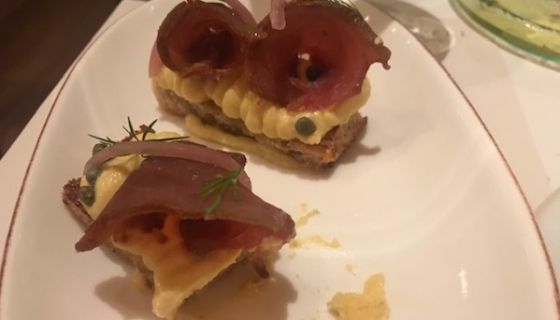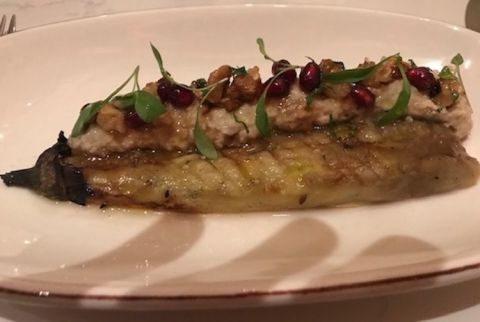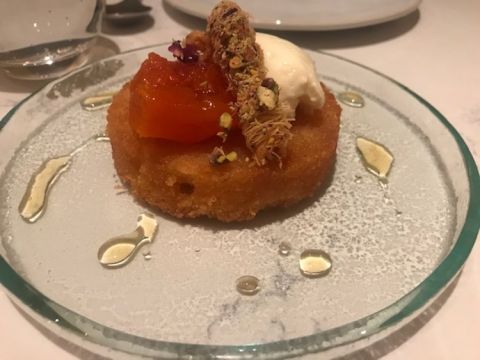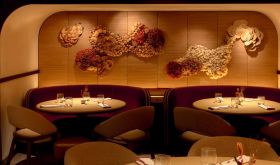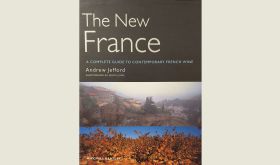I was sitting at a corner table on the mezzanine level of the recently opened Ampéli restaurant on Charlotte Street, London W1, enjoying my second dinner there, when I overheard a conversation that filled me with a sense of déjà vu.
Jenny Pagoni, the 30-year-old owner, had just escorted a middle-aged gentleman to the table next to ours. He asked for a glass of rosé champagne and it was Pagoni’s response that gave me cause to remember my years as a restaurateur.
‘I’m afraid that we don’t serve champagne, sir, but we do have a Greek sparkling wine instead.’ Her customer happily agreed to the alternative and in fact I even heard him recommend it to his colleague when he arrived.
The comparisons between Pagoni and a much younger version of myself are quite close. Pagoni has just turned 30; I was 29 when I opened L’Escargot a few hundred yards to the south in Greek Street in 1981. And both of us were of the opinion that there was only one way to convince our customers of the merits of the wines from the countries that had enchanted us – the US in my case, Greece in the case of the Greek-born Pagoni – and that was to give them no choice on the wine list. All my wines came from the USA while all the wines at Ampéli (the Greek for vineyard) come from Greece and its many islands.
My insistence on American wines came to an end after six months, principally because the wine-appreciating customers in London were not ready for them and also because the white wines were not dry enough for the then-prevailing taste. For Pagoni, these factors are far less important. Today, there is a big enough market to appreciate her courage, and Greek wines, particularly the whites, do meet the tastes of many of today’s restaurant-goers.
Pagoni and I share one other common trait. Each of us came to the restaurant trade as enthusiastic neophytes. I was formerly a commodity trader while Pagoni is an accomplished photographer. We also share similar backgrounds, mine Jewish while Pagoni’s is Greek, backgrounds that exude hospitality, the sharing of food, and the importance of the table.
Perhaps it was the length of time in the planning but Pagoni has certainly enlisted a crack team. Lorraine Abrahams is the general manager, formerly of Corbin and King, while Oren Goldfield, ex Nopi, is the head chef. This combination leaves Pagoni free to walk the floor: her Fitbit claims that she walked up and down the two flights of stairs 40 times the day before we met.
At our meeting Pagoni described her vision for a Greek wine restaurant serving the food of the Eastern Mediterranean coastline. To this brief, Goldfield and his team have made a convincing start.
The menu begins with a slight variation on the norm: starters and snacks are followed by ‘cold social plates’, then hot ones before the main courses. The waiting staff repeat the mantra that the dishes will come when they are ready, a meaningless phrase whose use I would like to see treated as a criminal offence.
Fish figures prominently in the opening three sections, far more than in the main courses. A dish of cured and seasoned sardines was enlivened by the presence of fennel seeds. Tuna had been treated like beef, as in Turkey, and was served as pastirma, dried and then sliced very thinly before being served on a broad-bean puree on toast, the whole spiced up again with capers, as shown at the top of this article.
Three other vegetable dishes - a plate of aubergine roasted in their Josper oven and served with a tahini puree; a dish of barrel-aged feta cheese, cleanly fried and served with a spicy tomato jam; and that unfashionable vegetable, kohlrabi, here cooked and topped with melted cheese – should delight anyone, even if a view of Charlotte Street is a poor substitute for one of the Aegean.
The only fish among the main courses is Cornish mackerel cooked well, again in the Josper, and served with Jerusalem artichokes. Pagoni promised more fish main courses but is aware of their cost. One meat dish, beef short ribs with Moroccan spices and quince, made an excellent accompaniment to a spiced potato burik with a runny egg and a tangy harissa mayonnaise shown below.
We finished with typically sticky desserts: loukomades, small hollow doughnuts dripping with mountain-tea syrup; and the semolina cake with a yoghurt mousse shown below. I would have liked to see a simpler variation on Greek yoghurt, an ingredient no one can readily refuse. With five glasses of exciting wine my bill for two came to £131.
But it is with its wine list that Ampéli makes the most distinctive impact on the London restaurant scene. It is clearly laid out and with all those difficult-to-pronounce Greek words translated phonetically with comparisons explicitly given, so dry Riesling and Chablis lovers should head for their range of Assyrtiko (ah-seer-tee-koh). And it is extremely wide-ranging not just in terms of the different styles of wines it offers but also in their geographical origins.
With input from Yiannis Karakasis, a Greek-born MW, there is a wide range of every style on offer: red, white, rosé, orange, low intervention and sparkling, wines that exhibit the tradition, hard work, authenticity and heritage of their makers.
Ampéli 18 Charlotte Street, London W1T 2LZ; tel +44 (0)20 3355 5370. Open seven days a week.

